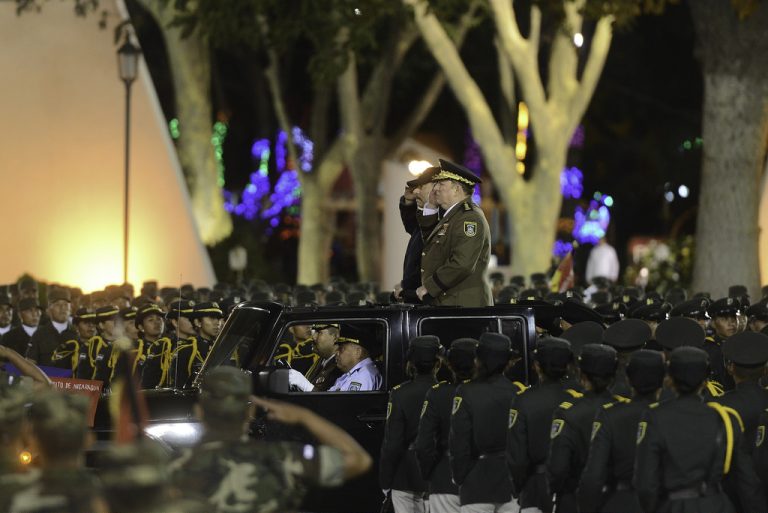10 de julio 2019

European Concern over Lack of Academic Freedom in Nicaragua

PUBLICIDAD 1M
PUBLICIDAD 4D
PUBLICIDAD 5D
Can the Army disarm and dismantle the paramilitaries, while General Aviles continues at the helm?

Army chief Julio Cesar Aviles with Daniel Ortega. Photo: Carlos Herrera / Confidencial
Since the Inter-American Commission on Human Rights of the OAS presented its preliminary report on Nicaragua in May of 2018, it established among its main recommendations to the State the dismantling of paramilitary groups. “The State must dismantle para-police groups and adopt measures to prevent the continued operation of groups of armed third parties that attack and harass the civilian population,” the IACHR stated.
Born out of the complaints from the victims and their relatives, and with the support of the Episcopal Conference of the Catholic Church, this demand has been reiterated in all national and international reports of human rights organizations: Cenidh, CPDH, IACHR, the High Commissioner of the UN, GIEI, Human Rights Watch and Amnesty International.
However, a year later, the dictatorship refuses to disarm and dismantle the paramilitary groups, despite the fact that in the first national dialogue, Foreign Minister Denis Moncada, on behalf of the Government, accepted all the recommendations of the Inter-American Commission on Human Rights.
The refusal responds to the strategic calculation of President Daniel Ortega to remain in power by the force of paramilitary terror, imposing an incalculable political cost on the Nicaraguan Army. Raised to “Supreme Police Chief,” according to the law reformed to suit him with the complicity of then Police Director, Aminta Granera, Ortega also has been crowned as the de facto leader of the paramilitaries.
The formation of a paramilitary force outside the Constitution confirms the institutional collapse of the National Police. It also reveals that under the command of General Julio Cesar Aviles, the Nicaraguan Army has become an instrument of complicity with the repression, acting as an extension of the State-Party-Family dictatorship.
It is unthinkable that any of the military leaders who preceded General Aviles in office since 1990, when the separation of the Army as a partisan institution began, -Humberto Ortega, Joaquin Cuadra, Javier Carrion or Omar Hallesleven- would have allowed, under a democratic government, that the presidency promote the creation of a paramilitary band. With Aviles, on the other hand, the Army capitulated in one of its fundamental missions by allowing, for the personal political and economic ambitions of its chief, the formation of these armed bodies that threaten national security.
In collusion with Ortega, Aviles first removed the then Chief of the General Staff and second in the military succession, General Oscar Balladares, and later facilitated a reform of the Military Code, which eventually enthroned him in power for 10 years, while Ortega promoted his own indefinite reelection. The enthronement of Aviles in the military command affects the process of professionalization of the Army, by imposing a “plug” on the ascents of the military ladder, while dozens of qualified high-ranking officers have been sent to retirement for political convenience.
For more than a decade, the Army fought armed groups with political motivations in the countryside, discredited as criminals, cattle rustlers and drug traffickers. They never appeared before a judge because they were only “killed in combat.” But under the command of Aviles that same army hasn’t dared to act against the paramilitary forces of President Ortega that operate in plain sight in the cities with high caliber weapons.
So far no paramilitary has been arrested or is under the process of investigation, for the crimes perpetrated before, during and after the fateful “Clean-Up Operation.” The Government intends to protect them under a self-amnesty law, which has been passed with the intention of leaving these crimes in impunity. An amnesty which has been appealed for unconstitutionality by the Mothers of April and the relatives of the victims of the repression, with the full conviction that sooner or later, in Nicaragua, truth and justice will prevail without impunity for crimes that have no statutory limitation.
The disarming of these groups and their submission to justice, including their leaders and promoters, is a sine-qua-non condition so that Nicaragua can hold free, transparent and competitive elections, and to create the conditions for a future police reform. Otherwise, post-Ortega Nicaragua, under a new democratic government, will be ungovernable with the permanence of these illegal armed groups.
But, can the Army disarm the paramilitaries, while General Julio Cesar Aviles remains at the head of the institution? Aviles inaction has cost the country in the last fifteen months more than 300 dead, thousands of wounded, tens of thousands of exiles, and an irreversible crisis of confidence and credibility in the military institution.
The Army has the legal and institutional powers to disarm and dismantle the paramilitaries. The crux of the problem lies in the submission of General Aviles to the FSLN strongman and de facto leader of the paramilitaries. That is the dilemma facing the Military Council of the Nicaraguan Army: to sink with Ortega, or try to become, once again, a national institution, with a leadership committed to dismantling the paramilitary bands.
Thank you for reading our English section, brought to you in collaboration with Havana Times. If you wish to subscribe to our English Weekly Newsletter, you can do it here. Please spread the word and share this link with your friends, family or contacts.
Regards,
PUBLICIDAD 3M
Periodista nicaragüense, exiliado en Costa Rica. Fundador y director de Confidencial y Esta Semana. Miembro del Consejo Rector de la Fundación Gabo. Ha sido Knight Fellow en la Universidad de Stanford (1997-1998) y profesor visitante en la Maestría de Periodismo de la Universidad de Berkeley, California (1998-1999). En mayo 2009, obtuvo el Premio a la Libertad de Expresión en Iberoamérica, de Casa América Cataluña (España). En octubre de 2010 recibió el Premio Maria Moors Cabot de la Escuela de Periodismo de la Universidad de Columbia en Nueva York. En 2021 obtuvo el Premio Ortega y Gasset por su trayectoria periodística.
PUBLICIDAD 3D